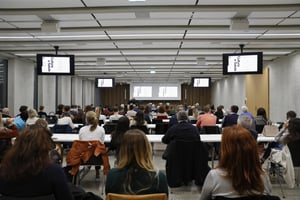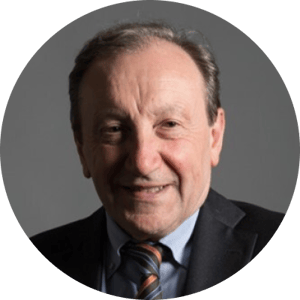
University course Cultura e Salute
A university course open to the public that offers new perspectives on the benefits of art and culture for people's health and well-being.
The university course Culture and Health was held from October to December 2021; it was an innovative programme, implemented in collaboration with Università della Svizzera italiana (USI) of Lugano and dedicated to students of the Faculty of Biomedical Sciences, but also open to the public.
The course saw prestigious figures from the world of culture, such as poets, artists and architects, as well as exponents of the scientific world, such as oncologists, neuroscientists and surgeons, discuss and exchange views on the link between culture and health.
During the seven meetings, the speakers discussed how art and cultural participation affect the physical and mental well-being of the individual, presenting new perspectives on the privileged relationship between these two areas.
The course provided interpretative keys on the impact of culture in the health sphere, through experiences and best practices conducted in the medical scientific field. Over 700 people attended the course, and 22 different speakers were involved in the seven lessons.
Full course programme
18.10.2021 - First lecture
Art, culture, health and wellness
--> Find out more
25.10.2021 - Second lecture
Inhabiting Spaces
--> Find ot more
08.11.2021 - Third lecture
A Dive into the Landscape
--> Find out more
15.11.2021 - Fourth lecture
The pursuit of happiness
--> Find out more
22.11.2021 - Fifth lecture
Mirror, mirror on the wall
--> Find out more
29.11.2021 - Sixth lecture
In Praise of Beauty
--> Find out more
06.12.2021 - Seventh lecture
Music, Soul and Body
--> Find out more
Where:
In the USI East campus Multipurpose Hall from 6 pm to 7:30 pm each monday from October to December
Art, culture, health and wellness
The role played by art and cultural participation on health: an overview
Key-note speaker:
Enzo Grossi, culture and health expert
--> Read the interview with Enzo Grossi
Discussion with:
- Graziano Martignoni, psychiatrist
- Emiliano Albanese, public health
The evidence on the role of cultural participation in health promotion is mainly based on observational studies.
Although sidelined until 10-15 years ago by the more traditional epidemiological entourage, observational studies have seen a significant increase in interest from the scientific community, both public and private, thanks to new methodological contributions in recent years.
This module will shine a light on the main studies conducted in various countries on the role of cultural participation in the promotion of health status.
The evidence available is convergent and unanimously supporting the significant role of cultural participation in extending lifespan and preventing min chronic degenerative diseases.
Inhabiting Spaces
Salutogenic theory on the role of architecture and the built environment's impact on health and well-being.
Key-note speaker:
Alan Dilani, designer
--> Read the interview with Alan Dilani
Discussion with:
- Mario Botta, architect
- Pietro Majno-Hurst, surgeon
Architecture can positively or negatively affect the quality of life and, therefore, health. Several studies address this relationship.
Salutogenic design is based on a greater awareness of the impact of the surrounding environment on human health and well-being.
The lecture aims to present and discuss how and which elements - such as the link between access to natural light and blood pressure, between overcrowding or chronic noise and psychological stress - can be better addressed in the design and thus in the realisation of a building in which human beings live, work, heal, learn or play.
A Dive into the Landscape
The Impacts of the Natural Environment on Health. Projects, methods, results and case studies.
Key-note speaker:
Giuseppina Spano, psychologist
--> Read the interview with Giuseppina Spano
Discussion with:
- Romolo Nottaris, mountaineer
- Giovanni Pedrazzini, cardiologist.
For most people, walking along a river, on a forest path, on a mountainside, or on a beach has a relaxing and pleasant effect. Both green space and blue space have the power to make people happier.
Until recently, these notions, well known even in the last century when Victorian doctors prescribed "sea air" as a cure for an assortment of anxieties and ailments, were part of common knowledge.
Now, however, there is scientific evidence confirming the healing power of pure nature.
Thus shinrin-yoku or forest bathing have become general concepts and practices, not only in Japan, for stress management. In fact, the perception of beauty can influence our physical and psychological well-being, generating positive feelings and emotions that can have a beneficial effect on our health.
The pursuit of happiness
Mind-body: how culture can contribute to preventing and treating stress-related pathologies.
Key-note speaker:
Antonella Delle Fave, physician-psychologist
--> Read the interview with Antonella Delle Fave
Discussion with:
- Daniele Finzi Pasca, director
- Greta Guarda, Molecular Biologist
The study of happiness is the main focus of positive psychology, a movement that emerged in the psychological sciences during the 1990s from studies and research on subjective well-being.
Since then, 'positive psychology' has provided significant innovative elements, both in terms of theory and application. Two basic perspectives can be identified within this discipline: on the one hand, the hedonic perspective, in which research and studies focus on the analysis of the pleasure dimension; on the other hand, the eudaimonic perspective, which focuses on the study of factors that promote the potential, personal fulfilment and development of the individual, also in relation to the development of the community.
Mirror, mirror on the wall.
Neurons and empathy - Art, beauty and empathy: the role of mirror neurons.
Key-note speaker:
Vittorio Gallese, neuroscientist
--> Read the interview with Vittorio Gallese
Discussion with:
- Michelangelo Pistoletto, artist
- Alain Kaelin, neurologist
The discovery of 'mirror neurons' has had repercussions that are rich in psychological, philosophical and social consequences. The discovery of mirror neurons has had far-reaching psychological, philosophical and social repercussions. These neurons function as motors of participation, which are activated by watching the movements and emotional reactions of another individual, in the same brain centres that would be activated if we ourselves were the protagonists.
Whether it is a painting, a symphony or a film, it does not matter: when we are in front of an art form worthy of the name, our brain and body react to its communicative power, also triggering mechanisms of emotional sharing with those around us.
This is why sharing aesthetic experiences with other people enhances positive emotions and contributes to collective well-being.
In Praise of Beauty
Neuroaesthetics: the neurobiological basis of beauty.
Key-note speaker:
Luca Ticini, cognitive neuroscientist
--> Read the interview with Luca Ticini
Discussion with:
- Fabio Pusterla, poet
- Andrea Alimonti, oncologist
Recent studies using advanced techniques for visualising brain activity, such as functional magnetic resonance imaging (fMRI), have shown that art stimulates certain areas of the brain involved in feelings of reward and well-being, generating a biochemical response very similar to that measured during falling in love.
These results show how aesthetic pleasure, desire and well-being are closely interconnected from a neurobiological point of view, and suggest how art and cultural participation can be beneficial against anxiety and depression.
Music, Soul and Body
The role of music as a tool for healing and promoting health.
Key-note speaker:
Alfredo Raglio, music therapy expert
--> Read the interview with Alfredo Raglio
Discussion with:
- Markus Poschner, orchestra conductor
- Silke Gillessen Sommer, oncologist
Scientific literature confirms the healing power of music, already known in antiquity and mythology. Over the centuries, music has become an object of interest in the medical and neuroscientific fields.
Today, strong scientific evidence supports the idea that music can be considered an effective healing tool, at all ages of life and in many clinical areas. Sound and music stimulate and regulate emotions, attention, cognitive functions, communication and behaviour.
An increasing number of studies are showing that listening to music: can make us happier and improve learning, especially at a young age; promotes connections between the hemispheres of the brain, communication and behaviour; as early as the perinatal period, improves early cognitive development; promotes active ageing and helps to manage and combat many diseases; helps to reduce stress, combat chronic pain, and recover motor and neurological functions that have been damaged by a stroke or traumatic event.
In the case of children on the autistic spectrum or with attention deficit and language difficulties, music is a resource for learning and relationships.
Prof. Enzo Grossi
Professor Enzo Grossi is a doctor, researcher, Scientific Advisor of the ALISEI National Technological Cluster of Life Sciences, Scientific Director of the Villa Santa Maria Institute of Child Neuropsychiatry in Tavernerio (Como) and Professor of the Culture and Health at the Faculty of Medicine of Turin University. He has taught the same subject at IULM in Milan and at Alma mater studiorum in Bologna University. He is a founding member of the Cultural Welfare Centre of Turin.
He is also an IBSA Foundation consultant for the Cultura e Salute project and course coordinator at USI.
